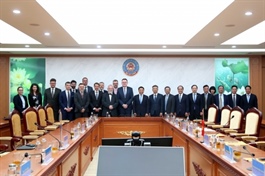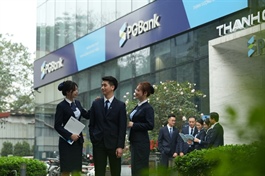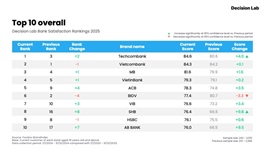Credit support offer to help navigate hurdles
Credit support offer to help navigate hurdles
Amid the country’s push to maintain 8 per cent growth, its central bank is compelled to keep interest rates low, while the banking sector rolls out a massive credit package to spur short- and medium-term growth.
On April 15, the State Bank of Vietnam (SBV) directed commercial banks to implement a credit programme worth $4 billion for the agriculture, forestry, and fishery sector. Fifteen top banks have been assigned to carry out the initiative, such as Agribank, which has registered to deploy $800 million in concessional lending under the programme.
These banks are responsible for tracking and reporting implementation results to the SBV and other relevant authorities, ensuring the accuracy of reported data.
“The commercial banks are accountable for implementing the scheme in accordance with its commitments, including target beneficiaries and applicable interest rates. Other commercial banks are also encouraged to participate,” the directive stated.
Previously, in 2023, the SBV launched a $600 million preferential loan package for the forestry and fishery sector, which proved highly effective. In 2024, the package’s scale was doubled to $1.2 billion.
At last week’s implementation meeting held by the SBV, commercial banks also reached a consensus to roll out a $20 billion credit package supporting science, technology, innovation, and strategic infrastructure amid new global trade dynamics, following Prime Minister Pham Minh Chinh’s directive on April 7.
Banks are already financing several major national infrastructure projects. Vietcombank, for example, is funding the Lao Cai-Vinh Yen transmission line, Nhon Trach 3 and 4 power plants, and Long Thanh International Airport.
A VIB representative confirmed that the bank is ready to provide $200-400 million in loans at interest rates about 1 per cent lower than standard market rates, in line with the government’s key policy priorities.
Beyond prioritised lending, commercial banks are swiftly rolling out early-stage support measures for clients affected by the new US tariff policy. For businesses facing widespread impacts, banks are calling for mechanisms to allow debt restructuring, loan classification maintenance, and interest and fee reductions.
“Credit is a key tool for supporting businesses,” emphasised Le Quang Vinh, CEO of Vietcombank. “However, for banks to support innovation-driven firms, we should consider capital contribution and benefit-sharing mechanisms instead of traditional loan models.”
Elsewhere, TPBank has signed a $100 million financing deal with Huu Nghi-Chi Lang Expressway JSC, ensuring resources to complete the project this year. The bank has already disbursed nearly $316 million for build-operate-transfer ventures such as the Cam Lam-Vinh Hao motorway and a coastal road between Thai Binh and Haiphong.
“Infrastructure lending is inherently challenging due to long payback periods and cash flow risks. Still, with our commitment to development, TPBank is determined to help resolve infrastructure bottlenecks,” said Do Minh Phu, chairman of TPBank.
SBV Deputy Governor Dao Minh Tu acknowledged that the current challenges are significantly impacting enterprises and key sectors, with downstream effects on labour markets. “Deploying the $20 billion credit package and timely support policies is now urgent. Banks must balance supporting businesses, ensuring capital efficiency, and maintaining operational safety. This credit package will primarily utilise commercial bank resources, with banks adjusting mobilised capital to suit lending needs,” Tu said.
An April 13 banking report by SSI emphasised that while short-term risks may be manageable, long-term uncertainties persist.
“Although US retaliatory tariffs pose medium-term risks to exports and banks, the 90-day tariff delay has temporarily eased concerns. Domestic inventory accumulation and stimulus measures may help offset some pressures. Still, long-term risks are expected to impact earnings more clearly by late 2025,” the report said.
SSI Research added that the government is likely to introduce stimulus measures such as accelerating public investment and supporting interest rates. Pham Luu Hung, chief economist and head of SSI Research, expects growth momentum will be domestically driven, aligning with the SBV’s 2024 credit growth target of over 16 per cent.
“Infrastructure lending used to be viewed as high-risk due to long payback periods and maturity mismatches. But with the government pushing public investment and streamlining procedures, businesses can recover capital faster, encouraging banks to scale up lending,” he added.
- 14:12 23/04/2025



























